广东省深圳市文汇中学八年级英语上册Module 2 Unit 3 Computer Reading 课件 (2)
文档属性
| 名称 | 广东省深圳市文汇中学八年级英语上册Module 2 Unit 3 Computer Reading 课件 (2) |
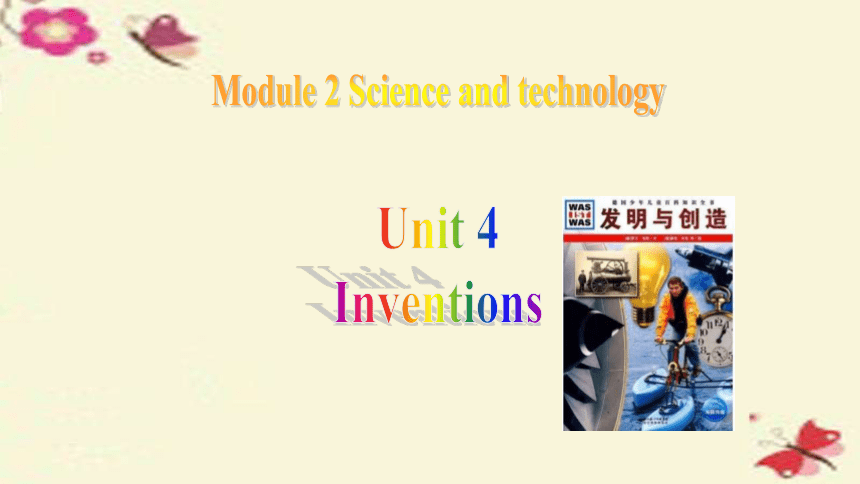
|
|
| 格式 | zip | ||
| 文件大小 | 2.1MB | ||
| 资源类型 | 教案 | ||
| 版本资源 | 牛津深圳版 | ||
| 科目 | 英语 | ||
| 更新时间 | 2016-12-13 00:00:00 | ||
图片预览


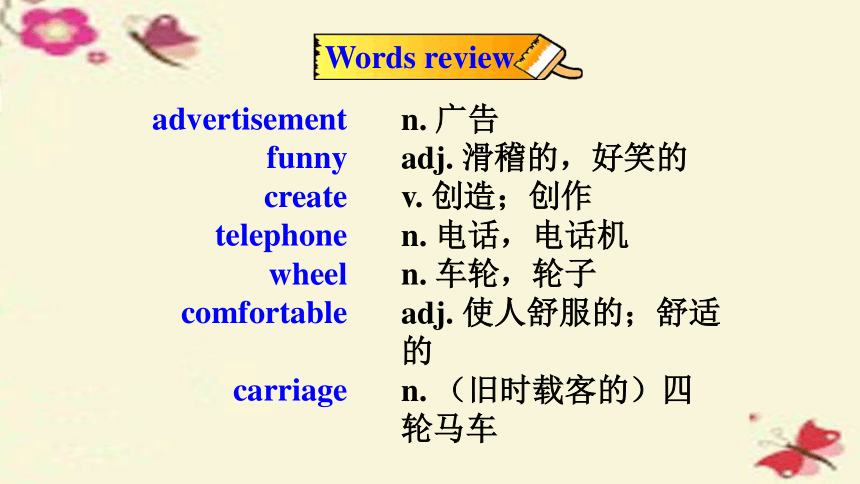
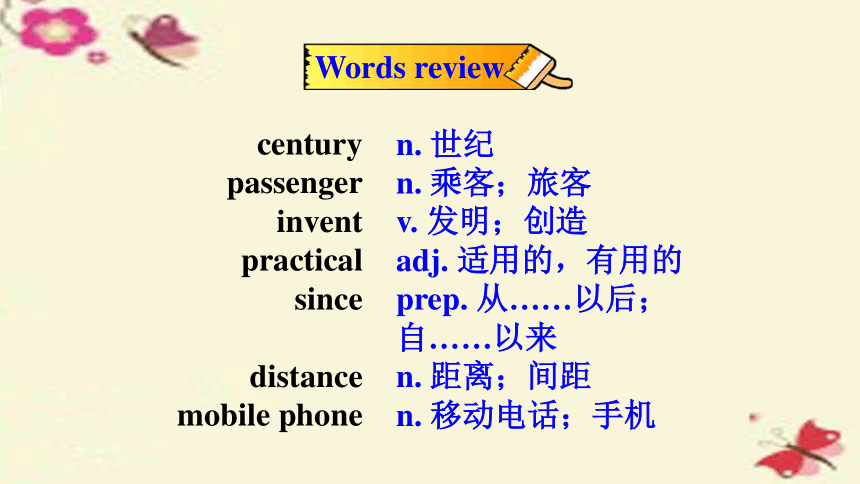
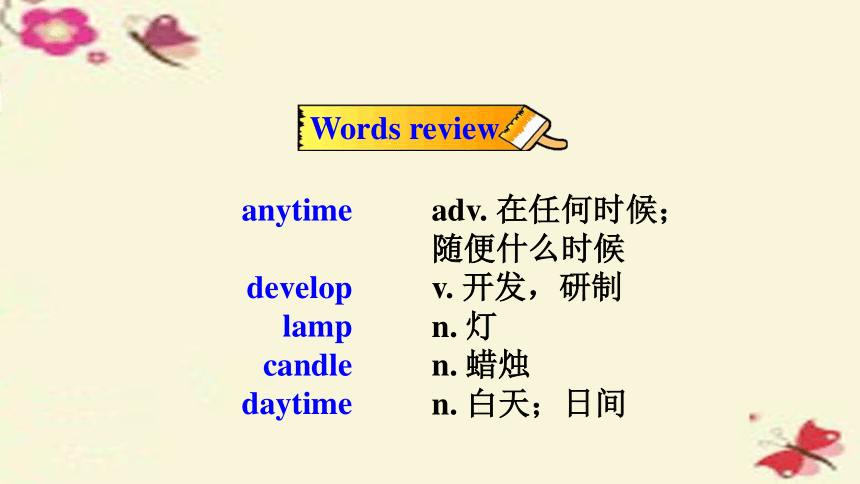
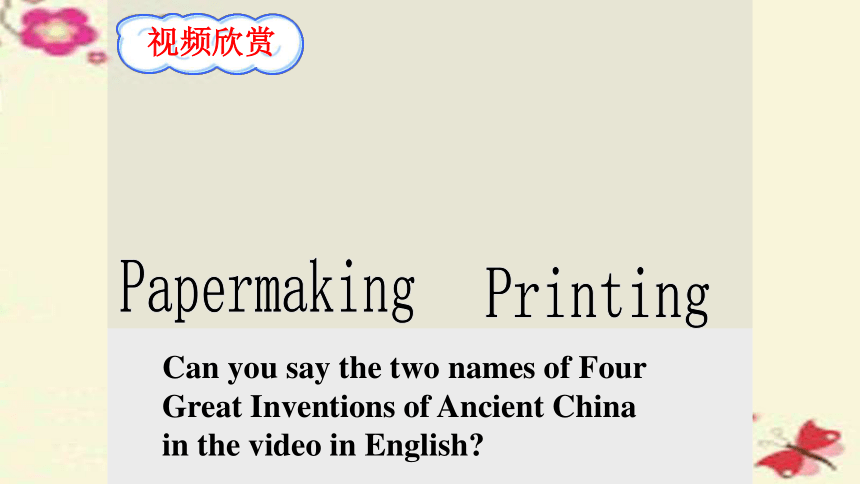
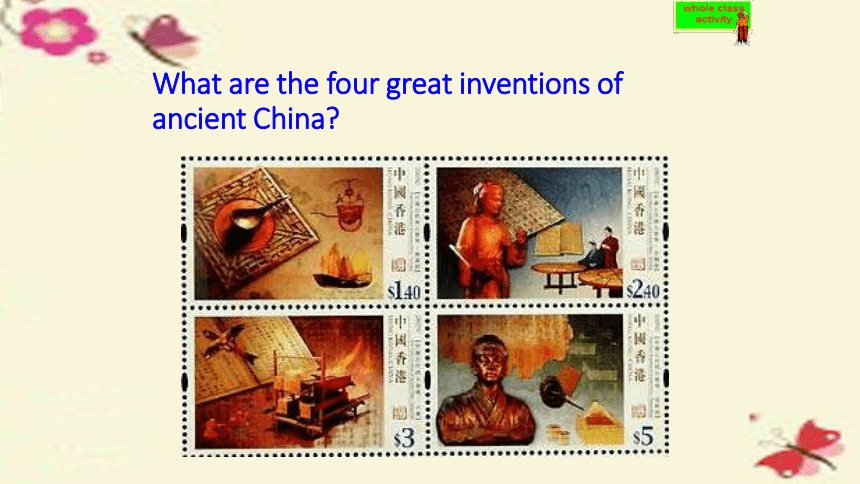
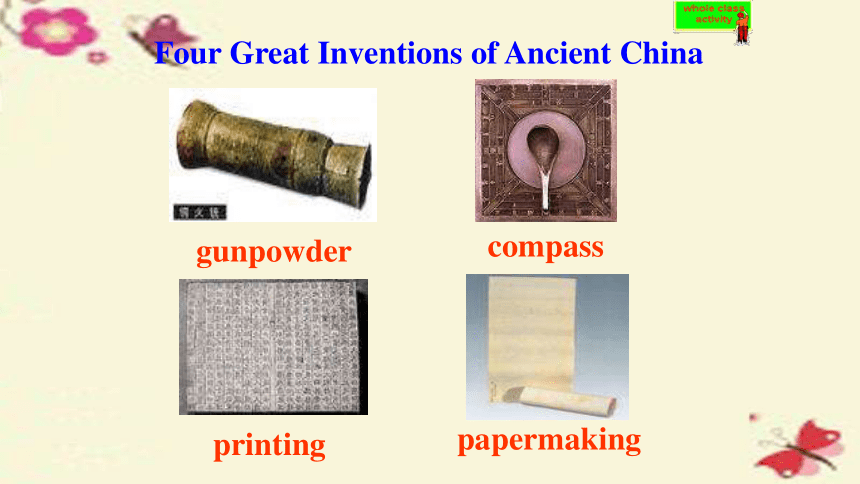
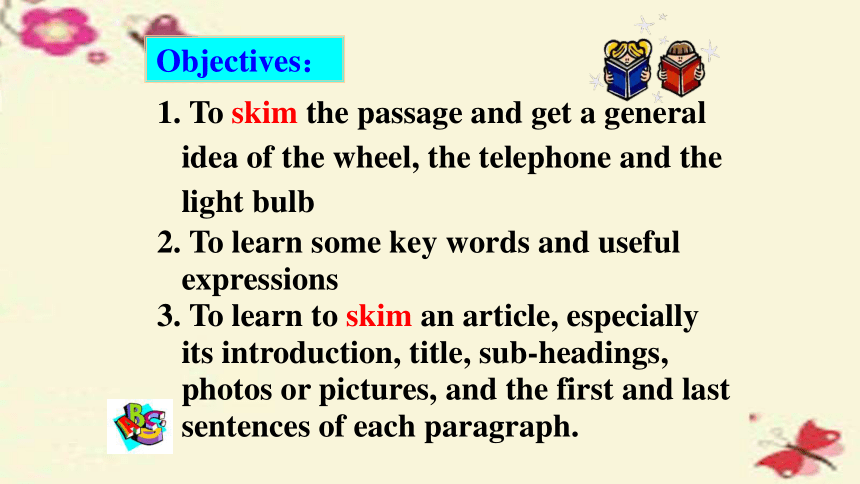
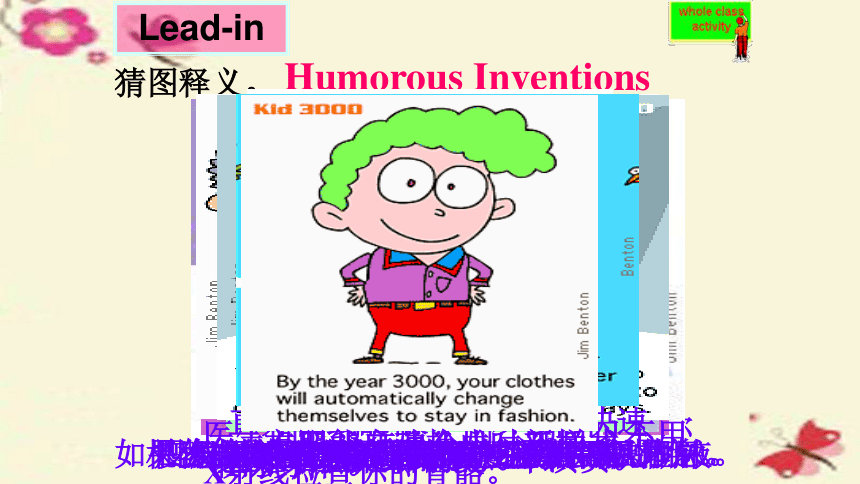

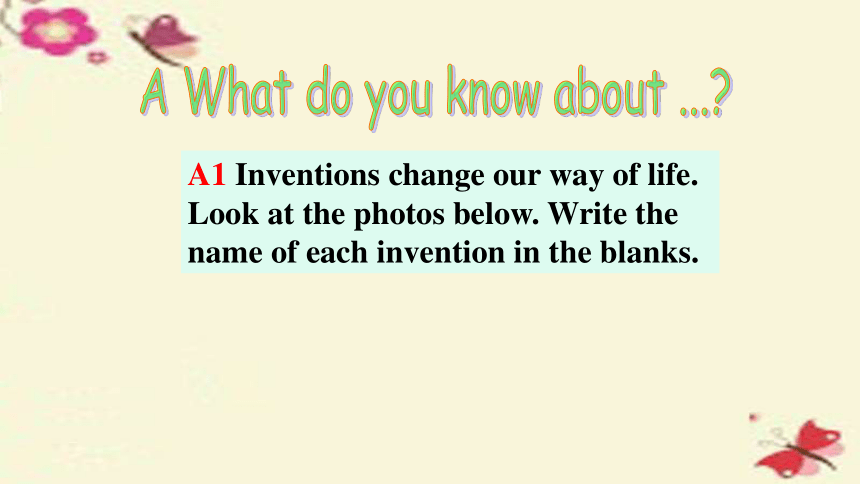
文档简介
课件49张PPT。Module 2 Science and technologyUnit 4
InventionsReadingGreat inventionsadvertisement
funny
create
telephone
wheel
comfortable
carriagen. 广告
adj. 滑稽的,好笑的
v. 创造;创作
n. 电话,电话机
n. 车轮,轮子
adj. 使人舒服的;舒适的
n. (旧时载客的)四轮马车century
passenger
invent
practical
since
distance
mobile phonen. 世纪
n. 乘客;旅客
v. 发明;创造
adj. 适用的,有用的
prep. 从……以后;自……以来
n. 距离;间距
n. 移动电话;手机anytime
develop
lamp
candle
daytimeadv. 在任何时候;随便什么时候
v. 开发,研制
n. 灯
n. 蜡烛
n. 白天;日间Can you say the two names of Four Great Inventions of Ancient China in the video in English? PapermakingPrintingWhat are the four great inventions of ancient China?compassgunpowderprintingFour Great Inventions of Ancient Chinapapermaking1. To skim the passage and get a general idea of the wheel, the telephone and the light bulb
2. To learn some key words and useful expressions
3. To learn to skim an article, especially its introduction, title, sub-headings, photos or pictures, and the first and last sentences of each paragraph.Objectives:机器自动为爸爸刮胡子,不必涂抹刮胡液。Humorous Inventions猜图释义。背包载你去上学。变成一身健康的古铜色皮肤只需几秒钟。感冒时,你的鼻子有专“机”护理。即使你在睡觉,机器人也可以帮你锻炼身体 。可以不换节目单换一个演员。 如果你要去其他大陆,你可以自
己开车去。四条腿的裤子保证你随时随地可以休息。你可以在卫生间里练习冲浪。汽车在停车标志前必须停车。如果你输入不健康词汇,电脑就会惩罚你。医生同时也是魔术师,他可以不用X射线检查你的骨骼。直升机式的帽子可以轻松快速地带你到达目的地 。衣服能自动换成时新样式。 Lead-inPre-readingA What do you know about ...?A1 Inventions change our way of life. Look at the photos below. Write the name of each invention in the blanks.computer light bulb paper
telephone train wheel 2 3
_________ __________ ________ 5 6
_________ ___________ _________ paper light bulb train wheel telephone computerp50AComputers help us find information easily. …A2 How do these inventions help us in our daily lives? In groups, discuss this with your classmates.B Before you readLook at the photos, the title, the introduction and the sub-headings of the article on page 51. Then answer the questions below. What three inventions will the article talk about?
2. Which invention do you think is the greatest invention? Why?The wheel, the telephone and the light bulb.I think it’s the wheel/the telephone/ the light bulb. Because…p50BGreat inventionsReading1. When did people start to use wheels on carriages?
A few thousand years ago.
2. Who invented one of the first practical telephones in 1876?
Alexander Graham Bell.
3. What did people use to see at night before the invention of the light bulb?
Oil lamps, gas lamps or candles. Please read the text and answer the following questions.The _____ is probably the greatest invention in history. Without the wheel, we would not have the ________, trains and ____.
One of the first practical telephones was _______ in 1876. People could _____ to each other ____ long distances. Today we use ______ phones to ____ __ _____ ____ each other anytime, anywhere.
Before the ________ of the light ____, people had to use oil lamps, ___ lamps or ______ to see at night. Now, people can do __ _____ things in the evenings __ ____ ___ in the daytime. Complete the passage according to the text. mobilewheelcarriagescarsinventedoverspeakkeep in touch withinventionbulbgascandles as manyas they canC Vocabularyp52CC1 Find words from the article on page 51 that have similar meanings to the words in italics below.1 My new shoes felt nice and soft. (line 7)
_____________
2 This modern city was only a small village a hundred years ago. (line 10) __________
3 All the people on the bus got excited when they arrived at the Great Wall. (line 11)
___________
4 The company produced a new camera last year. (line 24) ___________
5 The swimming pool is open during the day. (line 29) _________ comfortable century passengers developed daytimeC2 Complete the conversation below with the words from the box. Change their forms if necessary. anytime century comfortable daytime passengerBill: When did people first start using cars?
Maggie: People developed the first cars in the 1880s, and they started using cars a lot in the early 20th (1)_______.
Bill: I’m sure the people were very happy because cars are so fast and (2)___________.
Maggie: Not really. These early cars were very slow. They also created a lot of problems.
Bill: What do you mean?
Maggie: Most people still had horses then, and the new cars made loud noises and frightened them. Also, (3)__________ often got very dirty after a long ride, so many people didn’t use them.
Bill: I suppose that people could only drive in the (4)_______ because those cars didn’t have lights.
Maggie: That’s not true. They had lights, so people could drive them (5)________. century comfortable passengers daytime anytimeD Comprehensionp53DD1 Read the article on page 51 and complete the table below. Alexander Graham Bell Thomas Edison faster and more comfortable speak to each other over long distances do as many things in the evenings D2 Read the article again and answer the questions below in complete sentences. Which of the three things was invented first?
___________________________________
2. What inventions did the wheel make possible?
___________________________________
______________________The wheel was invented first.It made the inventions of carriages, trains and cars possible.D2 Read the article again and answer the questions below in complete sentences.3. How do mobile phones help people keep in touch with each other?
__________________________________
__________________________________
4. How did people see at night before the invention of the light bulb?
—————————————————
—————————————————They allow people to keep in touch with each other anytime, anywhere.They had to use oil lamps, gas lamps or candles to see at night.D3 Can you name some other great inventions? Why do you think they are great? Discuss these with your classmates.三人一组,讨论其他的一些伟大发明。
Step 1:其中一人说出自己认为的伟大发明内容。
Step 2:其他两人讨论这种发明给人们生活带来的美好和便利。
Step 3:最后一人,总结自己小组的讨论结果。1. Which invention do you think is the greatest invention?
do you think 作为特殊疑问句中的插入语,用来征询对方的意见或看法。若疑问词做主语,do you think 要放在疑问词之后,谓语动词之前。如:
What do you think is the most important thing for us to do to learn English well?
你认为要把英语学好我们应该做得最重要的事情是什么?Language points 2. Alexander Graham Bell invented one of the first practical telephones in 1876.
invent v. 发明
invention n. 发明
inventor n. 发明家
The Indians first invented and developed the 1 to 9 system of numbers.
印度人首先发明并发展了1-9的数字系统。invent 与 discover的区别
invent 指发明原来不存在的东西。discover 指发现原来就存在但是一直不被认识的东西。
Bell invented the telephone in 1876.
贝尔在1876年发明了电话。
Who discovered American in 1492?
是谁在1492年发现了美洲大陆?3. They allow people to keep in touch with each other anytime, anywhere.
(1) allow sb. to do sth.意为“允许某人做某事”,其中,动词不定式作宾语补足语。如:
My father allows me to play basketball after I finish my homework.
我的父亲允许我做完作业后打篮球。
They allowed her to go to the party.
他们允许她去参加聚会。(2) keep in touch with 意为“与……保持联系”,与touch相关的短语还有:get in/into touch with …“与……取得联系”,lose / be out of touch with …“与……失去联系”等。如:
He promised to keep in touch with us while he was abroad.
他答应在国外期间与我们保持联系。
I lost touch with Lucy after we moved.
我们搬家后,我就与露西失去了联系。① as many/few+可数名词复数+as
描述数目上的接近
② as much/little(少的)+不可数名词+as
描述量的相近,如:4. With light bulbs, people can do as many things in the evenings as they can in the daytime.You may borrow as many books as you can.
你能借多少书就借多少。
Drink as much water as you can.
你要尽可能的多喝些水。Let the word flyTips for teacherLet the word fly 板块是帮助学生学
习一些一词多义、熟词生义的词汇。
通过此环节,学生可以对一些常见词
的用法、意思有一个透彻的了解。KEEP1. keep in touch with 与……保持联系
Please keep in touch with me.
请与我保持联系。
2. keep up with 跟上
They walked so fast that I could not
keep up with them. ?? 他们走得那么快, 我没法跟上。
3. keep in mind 记住; 牢记
Keep?in?mind?that?youth?is?not?eternal.
记住,青春不是永久的。4. keep to 沿着……走
You must keep to the path.
你必须沿着小路走。
5. keep one’s head 保持镇静
You need to keep your head. ?? 你应该保持镇静。
6. keep away (使)远离
Would you keep your dog away from
my boy, please?
请让狗离我孩子远点好吗? 1. 政府应时刻为人民利益着想。
The government should always _____
the people’s interest ___ ______.
2. 你不能通过看电视真正地跟上世界事务。
You can’t ____ ___ ____ world affairs
by watching television.keepin mindkeep up with根据所给中文完成句子。 3. 手机不用时,将它放到远离身体的地方。
_____ your phone _____ from your
body when you are not using it.
4. 怀特先生在任何情况下都能保持镇静,
从不惊慌。
Mr. White can ____ ___ _____ in any
emergency, he is never likely to panic.Keepkeep his headawaykeep to
keep in mind
keep up with
keep away
keep one’s head
keep in touch with沿着……走
记住,放在心里
跟上,不落后于
(使)远离, 不接近
保持镇静
与……保持联系试着翻译下面的英文,注意单词keep的用法。LIVE1. live on 靠……生活
She still lives on her parents.
她仍依靠父母生活。
The old woman lives on the earnings
of her daughter. 那个老人靠她女儿的收入维持生活。
2. live out sth. 实现
The money enabled them to live out
their dreams.?? 这笔钱可以使他们实现自己的梦想。
3. live through 经历(艰难)
They lived through the long famine.
他们经历了长久的饥荒而未死。4. live with 忍受; 容忍
You have to learn to live with stress.
你得学会承受压力。
5. live off 靠……过活
He lives off fruit and nuts.?? 他靠水果和坚果维持生命。
6. live for sb./sth. 为……而活着
He lived for his art.
他为自己的艺术而活着。
7. live in 生活在
We live in a very interesting time in history.
我们生活在历史上一个非常有趣的的年代。 Now 2 minutes to test your spelling.Spelling Bee1. English-Chinese
funny, comfortable, carriage, passenger, practical, since, anytime
2. Chinese-English
广告,创造,电话,车轮,世纪,发明,距离,开发,蜡烛When finished, exchange your papers to see who does the best.1. There are too many _____________ (广告) on TV now.
2. We saw two ________ (四轮马车) in the City Museum.
3. Here is some ________ (实用的) advice for you to solve the problem.
4. Is there anything _______ (特别的) in this picture?
5. In the ___________ (引言), he explains why he wrote the book.advertisementscarriages practicalspecialintroductionI. 根据汉语提示补全句子。II. 根据所给的中文补全下列英语句子。
1. 一些发明改变了世界。
Some inventions _______ ___ _____.
2. 那所房子建于20世纪早期。
That house was built __ __ _____
____ _______.
3. 你认为哪一辆车最好?
Which car ____________________? changed the world in the early 20th centurydo you think is the best 3. 我十三岁时开始使用这台电脑。
I ___________ __ ___ this computer when I was 13 years old.
4.你要努力记住尽可能多的英语单词。
Try to remember ____ ____ English words _____ you can.
5. 他们的帮助使得这次聚会成为可能。
Their help _____ the party ________. started/began to useas many made possibleasHomeworkRemember new words and phrases by heart after class.
2. Read the articles in Learning English. The more you read, the faster and better you’ll understand.
3. Preview Listening on page 54.
InventionsReadingGreat inventionsadvertisement
funny
create
telephone
wheel
comfortable
carriagen. 广告
adj. 滑稽的,好笑的
v. 创造;创作
n. 电话,电话机
n. 车轮,轮子
adj. 使人舒服的;舒适的
n. (旧时载客的)四轮马车century
passenger
invent
practical
since
distance
mobile phonen. 世纪
n. 乘客;旅客
v. 发明;创造
adj. 适用的,有用的
prep. 从……以后;自……以来
n. 距离;间距
n. 移动电话;手机anytime
develop
lamp
candle
daytimeadv. 在任何时候;随便什么时候
v. 开发,研制
n. 灯
n. 蜡烛
n. 白天;日间Can you say the two names of Four Great Inventions of Ancient China in the video in English? PapermakingPrintingWhat are the four great inventions of ancient China?compassgunpowderprintingFour Great Inventions of Ancient Chinapapermaking1. To skim the passage and get a general idea of the wheel, the telephone and the light bulb
2. To learn some key words and useful expressions
3. To learn to skim an article, especially its introduction, title, sub-headings, photos or pictures, and the first and last sentences of each paragraph.Objectives:机器自动为爸爸刮胡子,不必涂抹刮胡液。Humorous Inventions猜图释义。背包载你去上学。变成一身健康的古铜色皮肤只需几秒钟。感冒时,你的鼻子有专“机”护理。即使你在睡觉,机器人也可以帮你锻炼身体 。可以不换节目单换一个演员。 如果你要去其他大陆,你可以自
己开车去。四条腿的裤子保证你随时随地可以休息。你可以在卫生间里练习冲浪。汽车在停车标志前必须停车。如果你输入不健康词汇,电脑就会惩罚你。医生同时也是魔术师,他可以不用X射线检查你的骨骼。直升机式的帽子可以轻松快速地带你到达目的地 。衣服能自动换成时新样式。 Lead-inPre-readingA What do you know about ...?A1 Inventions change our way of life. Look at the photos below. Write the name of each invention in the blanks.computer light bulb paper
telephone train wheel 2 3
_________ __________ ________ 5 6
_________ ___________ _________ paper light bulb train wheel telephone computerp50AComputers help us find information easily. …A2 How do these inventions help us in our daily lives? In groups, discuss this with your classmates.B Before you readLook at the photos, the title, the introduction and the sub-headings of the article on page 51. Then answer the questions below. What three inventions will the article talk about?
2. Which invention do you think is the greatest invention? Why?The wheel, the telephone and the light bulb.I think it’s the wheel/the telephone/ the light bulb. Because…p50BGreat inventionsReading1. When did people start to use wheels on carriages?
A few thousand years ago.
2. Who invented one of the first practical telephones in 1876?
Alexander Graham Bell.
3. What did people use to see at night before the invention of the light bulb?
Oil lamps, gas lamps or candles. Please read the text and answer the following questions.The _____ is probably the greatest invention in history. Without the wheel, we would not have the ________, trains and ____.
One of the first practical telephones was _______ in 1876. People could _____ to each other ____ long distances. Today we use ______ phones to ____ __ _____ ____ each other anytime, anywhere.
Before the ________ of the light ____, people had to use oil lamps, ___ lamps or ______ to see at night. Now, people can do __ _____ things in the evenings __ ____ ___ in the daytime. Complete the passage according to the text. mobilewheelcarriagescarsinventedoverspeakkeep in touch withinventionbulbgascandles as manyas they canC Vocabularyp52CC1 Find words from the article on page 51 that have similar meanings to the words in italics below.1 My new shoes felt nice and soft. (line 7)
_____________
2 This modern city was only a small village a hundred years ago. (line 10) __________
3 All the people on the bus got excited when they arrived at the Great Wall. (line 11)
___________
4 The company produced a new camera last year. (line 24) ___________
5 The swimming pool is open during the day. (line 29) _________ comfortable century passengers developed daytimeC2 Complete the conversation below with the words from the box. Change their forms if necessary. anytime century comfortable daytime passengerBill: When did people first start using cars?
Maggie: People developed the first cars in the 1880s, and they started using cars a lot in the early 20th (1)_______.
Bill: I’m sure the people were very happy because cars are so fast and (2)___________.
Maggie: Not really. These early cars were very slow. They also created a lot of problems.
Bill: What do you mean?
Maggie: Most people still had horses then, and the new cars made loud noises and frightened them. Also, (3)__________ often got very dirty after a long ride, so many people didn’t use them.
Bill: I suppose that people could only drive in the (4)_______ because those cars didn’t have lights.
Maggie: That’s not true. They had lights, so people could drive them (5)________. century comfortable passengers daytime anytimeD Comprehensionp53DD1 Read the article on page 51 and complete the table below. Alexander Graham Bell Thomas Edison faster and more comfortable speak to each other over long distances do as many things in the evenings D2 Read the article again and answer the questions below in complete sentences. Which of the three things was invented first?
___________________________________
2. What inventions did the wheel make possible?
___________________________________
______________________The wheel was invented first.It made the inventions of carriages, trains and cars possible.D2 Read the article again and answer the questions below in complete sentences.3. How do mobile phones help people keep in touch with each other?
__________________________________
__________________________________
4. How did people see at night before the invention of the light bulb?
—————————————————
—————————————————They allow people to keep in touch with each other anytime, anywhere.They had to use oil lamps, gas lamps or candles to see at night.D3 Can you name some other great inventions? Why do you think they are great? Discuss these with your classmates.三人一组,讨论其他的一些伟大发明。
Step 1:其中一人说出自己认为的伟大发明内容。
Step 2:其他两人讨论这种发明给人们生活带来的美好和便利。
Step 3:最后一人,总结自己小组的讨论结果。1. Which invention do you think is the greatest invention?
do you think 作为特殊疑问句中的插入语,用来征询对方的意见或看法。若疑问词做主语,do you think 要放在疑问词之后,谓语动词之前。如:
What do you think is the most important thing for us to do to learn English well?
你认为要把英语学好我们应该做得最重要的事情是什么?Language points 2. Alexander Graham Bell invented one of the first practical telephones in 1876.
invent v. 发明
invention n. 发明
inventor n. 发明家
The Indians first invented and developed the 1 to 9 system of numbers.
印度人首先发明并发展了1-9的数字系统。invent 与 discover的区别
invent 指发明原来不存在的东西。discover 指发现原来就存在但是一直不被认识的东西。
Bell invented the telephone in 1876.
贝尔在1876年发明了电话。
Who discovered American in 1492?
是谁在1492年发现了美洲大陆?3. They allow people to keep in touch with each other anytime, anywhere.
(1) allow sb. to do sth.意为“允许某人做某事”,其中,动词不定式作宾语补足语。如:
My father allows me to play basketball after I finish my homework.
我的父亲允许我做完作业后打篮球。
They allowed her to go to the party.
他们允许她去参加聚会。(2) keep in touch with 意为“与……保持联系”,与touch相关的短语还有:get in/into touch with …“与……取得联系”,lose / be out of touch with …“与……失去联系”等。如:
He promised to keep in touch with us while he was abroad.
他答应在国外期间与我们保持联系。
I lost touch with Lucy after we moved.
我们搬家后,我就与露西失去了联系。① as many/few+可数名词复数+as
描述数目上的接近
② as much/little(少的)+不可数名词+as
描述量的相近,如:4. With light bulbs, people can do as many things in the evenings as they can in the daytime.You may borrow as many books as you can.
你能借多少书就借多少。
Drink as much water as you can.
你要尽可能的多喝些水。Let the word flyTips for teacherLet the word fly 板块是帮助学生学
习一些一词多义、熟词生义的词汇。
通过此环节,学生可以对一些常见词
的用法、意思有一个透彻的了解。KEEP1. keep in touch with 与……保持联系
Please keep in touch with me.
请与我保持联系。
2. keep up with 跟上
They walked so fast that I could not
keep up with them. ?? 他们走得那么快, 我没法跟上。
3. keep in mind 记住; 牢记
Keep?in?mind?that?youth?is?not?eternal.
记住,青春不是永久的。4. keep to 沿着……走
You must keep to the path.
你必须沿着小路走。
5. keep one’s head 保持镇静
You need to keep your head. ?? 你应该保持镇静。
6. keep away (使)远离
Would you keep your dog away from
my boy, please?
请让狗离我孩子远点好吗? 1. 政府应时刻为人民利益着想。
The government should always _____
the people’s interest ___ ______.
2. 你不能通过看电视真正地跟上世界事务。
You can’t ____ ___ ____ world affairs
by watching television.keepin mindkeep up with根据所给中文完成句子。 3. 手机不用时,将它放到远离身体的地方。
_____ your phone _____ from your
body when you are not using it.
4. 怀特先生在任何情况下都能保持镇静,
从不惊慌。
Mr. White can ____ ___ _____ in any
emergency, he is never likely to panic.Keepkeep his headawaykeep to
keep in mind
keep up with
keep away
keep one’s head
keep in touch with沿着……走
记住,放在心里
跟上,不落后于
(使)远离, 不接近
保持镇静
与……保持联系试着翻译下面的英文,注意单词keep的用法。LIVE1. live on 靠……生活
She still lives on her parents.
她仍依靠父母生活。
The old woman lives on the earnings
of her daughter. 那个老人靠她女儿的收入维持生活。
2. live out sth. 实现
The money enabled them to live out
their dreams.?? 这笔钱可以使他们实现自己的梦想。
3. live through 经历(艰难)
They lived through the long famine.
他们经历了长久的饥荒而未死。4. live with 忍受; 容忍
You have to learn to live with stress.
你得学会承受压力。
5. live off 靠……过活
He lives off fruit and nuts.?? 他靠水果和坚果维持生命。
6. live for sb./sth. 为……而活着
He lived for his art.
他为自己的艺术而活着。
7. live in 生活在
We live in a very interesting time in history.
我们生活在历史上一个非常有趣的的年代。 Now 2 minutes to test your spelling.Spelling Bee1. English-Chinese
funny, comfortable, carriage, passenger, practical, since, anytime
2. Chinese-English
广告,创造,电话,车轮,世纪,发明,距离,开发,蜡烛When finished, exchange your papers to see who does the best.1. There are too many _____________ (广告) on TV now.
2. We saw two ________ (四轮马车) in the City Museum.
3. Here is some ________ (实用的) advice for you to solve the problem.
4. Is there anything _______ (特别的) in this picture?
5. In the ___________ (引言), he explains why he wrote the book.advertisementscarriages practicalspecialintroductionI. 根据汉语提示补全句子。II. 根据所给的中文补全下列英语句子。
1. 一些发明改变了世界。
Some inventions _______ ___ _____.
2. 那所房子建于20世纪早期。
That house was built __ __ _____
____ _______.
3. 你认为哪一辆车最好?
Which car ____________________? changed the world in the early 20th centurydo you think is the best 3. 我十三岁时开始使用这台电脑。
I ___________ __ ___ this computer when I was 13 years old.
4.你要努力记住尽可能多的英语单词。
Try to remember ____ ____ English words _____ you can.
5. 他们的帮助使得这次聚会成为可能。
Their help _____ the party ________. started/began to useas many made possibleasHomeworkRemember new words and phrases by heart after class.
2. Read the articles in Learning English. The more you read, the faster and better you’ll understand.
3. Preview Listening on page 54.
